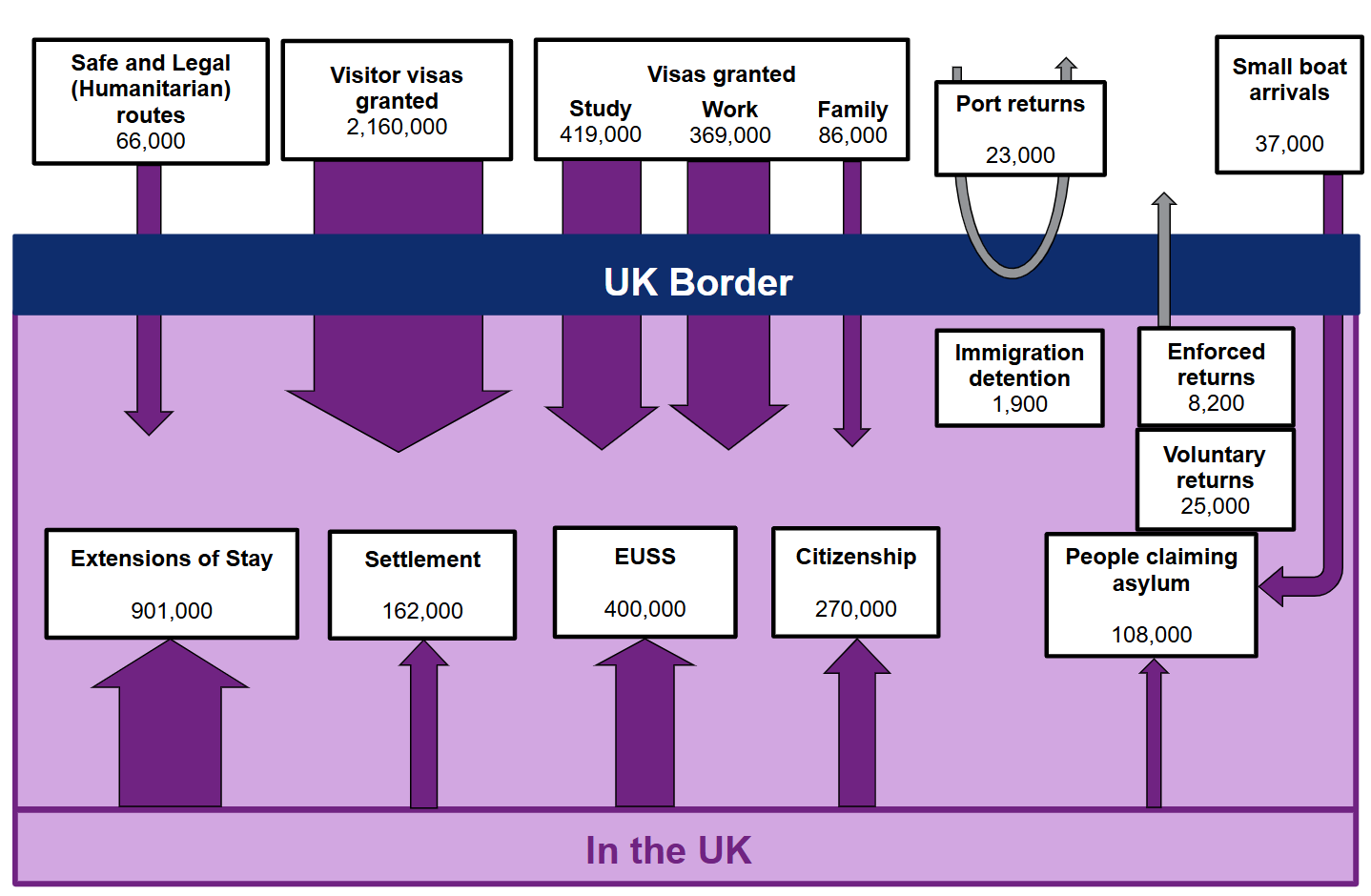Charlie Cole has a keen interest in British politics, with a focus on immigration.
Recently an article was published in The Times, reporting that from 2028, the Home Office expects net-migration to settle at around 525,000 per year, up from their previous estimate of net-migration settling at around 340,000 per year, an expected increase of nearly 200,000 per year.
The article states that this is because more migrants are choosing to stay in the UK for longer or they settle, either by extending their study & work visas, or by applying for Indefinite Leave to Remain (ILR) and subsequently citizenship.
Let’s be clear, the Home Office is not powerless here, allowing net-migration to get to these levels in the first place and allowing migrants to settle so easily are political choices, ones the UK doesn’t have to make.
If we look at the latest statistics for 2024, we can get a breakdown of immigration into the UK.
From this graphic, taken from the link above, we can see that in 2024, there were over 900,000 extensions of stay, essentially people who are already in the UK on a work or study visa and have applied to extend their visa and stay in the UK for longer, which the Home Office has granted.
The Home Office also granted over 160,000 people settlement; this is another word for Indefinite Leave to Remain (ILR). Most migrants can apply for ILR after being in the UK for as little as 5-years, and once obtained, currently entitles them to remain in the UK indefinitely, leave the UK and keep ILR, as long as they return within 2-years, access public services & benefits like the NHS & social housing and grants any children they have who were born in the UK automatic British citizenship — in England & Wales in 2023, 31.8 per cent of births were to foreign born mothers.
That same year, the Home Office also granted 270,000 people citizenship, which will entitle them to full national status, including the removal of any travel or time limit restrictions (like the aforementioned limit of leaving the UK for up-to 2-years with ILR), the ability to obtain a British passport and to stand and vote in UK elections, assuming they weren’t from a Commonwealth country, in which case they can already vote in UK elections, even if they don’t have British citizenship.
The Home Office also granted a further 874,000 new visas, 419,000 were study visas, 369,000 were work visas and 86,000 were family reunification visas.
So, to recap, in 2024, the Home Office:
- Issued 874,000 new work, study or family visas
- Extended over 900,000 existing visas
- Granted settlement (ILR) to 162,000 people
- Granted citizenship to 270,000 people
This doesn’t even include the cumulative impact from previous years, this just looks at 2024.
The Centre for Migration Control, which previously predicted the Home Office would revise up their long term net-migration figure from 340,000, has previously reported that with these levels of immigration, ¼ of the UK’s population will be a first generation immigrant by 2035.
Not to downplay the problem of illegal immigration, which does need to be addressed and is already worse under Labour, with 2025 on-track to be a record year for channel crossings.
As of writing, and according to the Spectator’s migration tracker, small boat crossings are 27 per cent higher in 2025, when compared to the same period in 2024.
But even so, 37,000 arriving on small boat in 2024 pales in comparison to the numbers of people that arrived legally. Even if illegal immigration via small boat was to double in 2025 to 74,000, it would still be 12,000 fewer than the number of family visas issued in 2024, and orders of magnitude lower than the numbers that arrived on a work or study visa.
It’s disingenuous for the Home Office to act surprised that more migrants are settling than anticipated, they are the ones who are allowing them to settle in the first place.
If the Government and Home Office actually want to reduce immigration into the UK and stop more migrants settling long-term, this would be rather trivial:
- Stop issuing so many work and study visas (874,000 were issued in 2024)
- Stop extending so many existing visas (901,000 were extended in 2024)
- Make it harder to obtain Indefinite Leave to Remain (162,000 ILR grants in 2024)
- Make it harder to obtain British citizenship (270,000 citizenship grants in 2024)
The Government and Home Office could make both ILR and citizenship more expensive by increasing the fees, putting in place a minimum salary threshold and making them harder to obtain by increasing the qualifying periods for both, currently most immigrants can obtain ILR after being in the UK for 5-years, then once they have ILR (which has around a 95 per cent grant rate), they only have to wait a further 12 months before they can apply for citizenship, which, according to data from 2022, has a similar grant rate to ILR, with only 4.3 per cent of applicants being rejected for citizenship.
With a few strokes of the Whitehall pen and some primary legislation, the Government could drastically reduce immigration into the UK, make it much harder for migrants to settle and even have net-emigration for years to come, if they truly wanted to.
Allowing immigration to get this high in the first place and allowing millions of immigrants to settle in the coming years is a political choice, it’s not some divine act of God that is forcing the Home Office to admit so many migrants and subsequently grant them ILR or citizenship, these are political choices that we don’t have to make.



![‘It’s a Recipe for a Hundred Years of National Dominance’: Stephen Miller [WATCH]](https://www.right2024.com/wp-content/uploads/2025/05/Stephen-Miller-Completely-Obliterates-CNN-Host-Over-Her-Illegal-Immigration-350x250.jpg)

![Trump Posts Hilarious Pope Meme, Leftists Immediately Melt Down [WATCH]](https://www.right2024.com/wp-content/uploads/2025/05/Trump-Posts-Hilarious-Pope-Meme-Leftists-Immediately-Melt-Down-WATCH-350x250.jpg)

![Wild Road Rage Brawl Erupts in Milwaukee [WATCH]](https://www.right2024.com/wp-content/uploads/2025/05/Road-Rage-Turns-Violent-in-Oregon-Minivan-Mows-Down-Motorcyclist-350x250.jpg)



![Karoline Leavitt Calls for Jill Biden to Answer for Joe's Cognitive Decline Cover-Up [WATCH]](https://www.right2024.com/wp-content/uploads/2025/05/Karoline-Leavitt-Calls-for-Jill-Biden-to-Answer-for-Joes-350x250.jpg)





